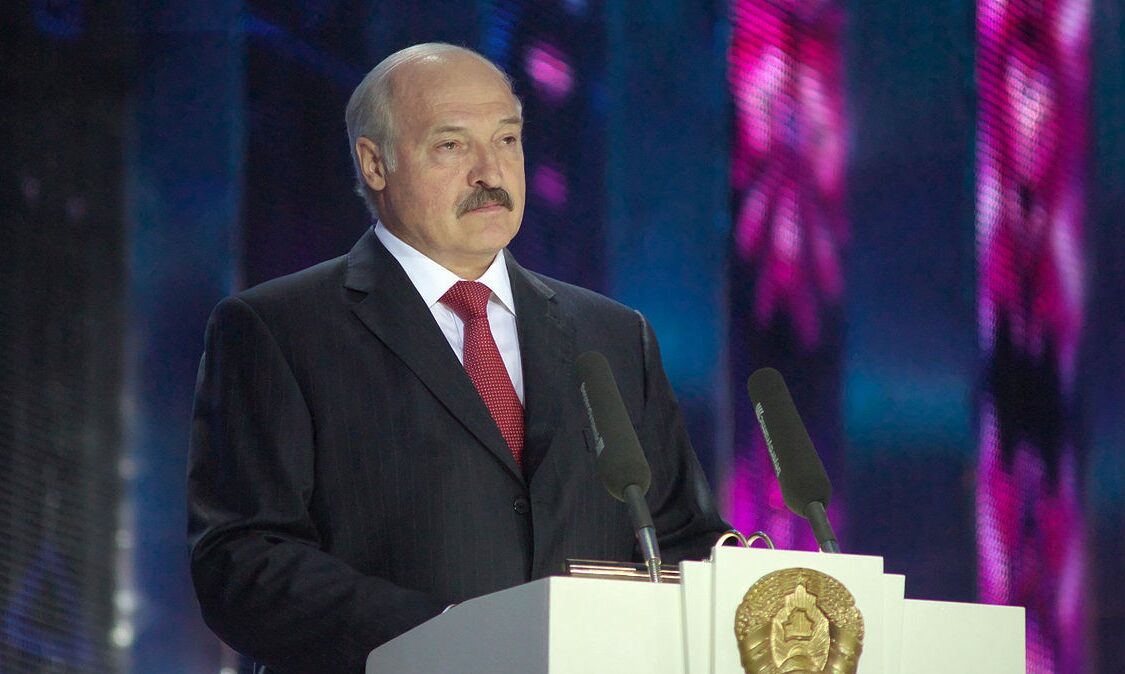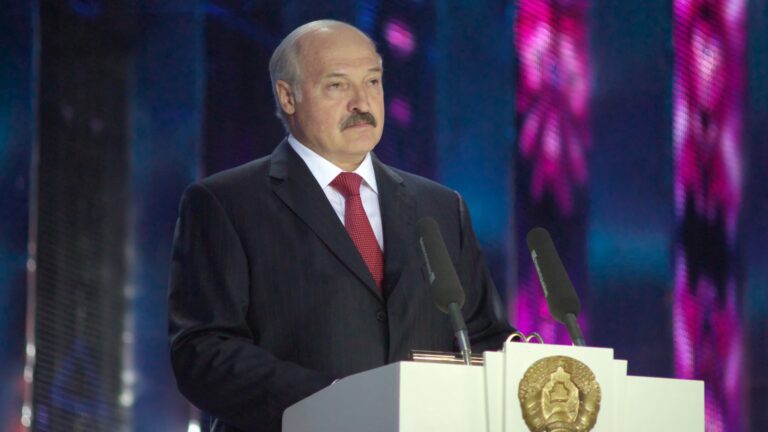
While Minsk places high expectations on China to replace the closed Western commodity and financial markets, and access to technologies, Beijing is reluctant to extend a helping hand due to strained relations between Belarus and the West.
Three Major Developments
In the last two years, Belarus-China relations have been affected by three extraordinary events: the COVID-19 pandemic, a deep political crisis in Belarus and the undermining of its sovereignty by Moscow, and Russian wide-scale military aggression against Ukraine, including from the territory of Belarus since February 2022.
The pandemic contributed to the political rapprochement of the two countries, with reciprocal shipments of humanitarian cargo. While Belarusian ruler Alexander Lukashenko spoke out against the use of western vaccines for political reasons and Minsk did not join the EU-funded COVAX initiative in which western vaccines were distributed in the Eastern Partnership countries, China donated to Belarus about 5 million doses of their own COVID-19 vaccine. At the same time the pandemic complicated the trade and investment interaction between Minsk and Beijing, and the implementation of the Chinese Belt and Road Initiative in the country slowed down.
The deepening political crisis in Belarus which followed the rigged 2020 presidential election and a brutal crackdown on unprecedentedly massive protests, made China increasingly concerned about the prospects of bilateral cooperation. Beijing’s concerns stemmed mostly from the worsening of Belarus-West relations rather than from domestic developments, which included an even greater centralization of power and militarization of the political regime. Growing Belarus-EU tensions and widening EU sanctions increased risks of logistics disruptions for railway shipments through Belarus and for investing in Belarus-based projects.
The situation worsened after the Ryanair Flight 4978 incident in May 2021, which provoked broad EU economic sanctions against a number of key sectors of Belarusian economy, including the potash industry which is closely eyed by China. The suspension of China Development Bank loans for Slavkaly to develop the second Belarusian enterprise to make potash fertilizers in 2021 was telling in this regard. The project is owned by the Russian businessman Mikhail Gutseriev, who was sanctioned by the EU in June 2021 for “benefitting from and supporting the Lukashenko regime.” It, therefore, became increasingly clear that deteriorating relations between Minsk and Brussels are at odds with Beijing’s economic interest.
The Russian-Ukrainian war only exacerbated this trend. The use of Belarusian territory and infrastructure in the wide-scale Russian invasion of Ukraine resulted in even more strained Belarus-West relations. The EU broadened sanctions against Belarus and western companies downplayed their involvement or completely withdrew from the Chinese-Belarusian Industrial Park (CBIP). According to the official estimate by Belarus, in 2021, over 80 percent of the transit of container trains on the route from China to the EU passed through the country (no Belarusian official statistics for 2022 are yet available.)
While Belarus’s significant role in the Northern corridor between China and the EU is undeniable, this route’s prospects are increasingly questioned due to the possible escalation of the Russian-Ukrainian war and its consequences. According to Chinese statistics, which considers Russia as a European destination along the New Silk Road, in 2022 traffic volumes between China and Europe increased by 9 percent compared to 2021. However, when Russia is not accounted for, the data shows that the traffic between European hubs and China in 2022 dropped by over 30 percent. Although the Middle Corridor connecting China and Europe via Central Asia, the Caucasus, and the Black Sea absorbed just a few percent of the China-EU trade in the EU in 2022, Beijing’s interest in this alternative route might eventually grow.
Publicly, ‘Business as Usual’
China and Belarus prefer keeping ‘strategic silence’ about the problematic aspects of economic and investment cooperation. Beijing constantly avoids making any negative public statements on the development of ties. Unsurprisingly, none of the eleven interviews with Chinese Ambassador Xie Xiaoyong released between November 2020 and October 2022 by the Belarusian state news agency Belta mention any problematic aspects of relations. In fact, only three of these interviews were devoted to relations between China and Belarus while the rest concerned China’s domestic and foreign policy agenda.
Minsk also rarely admits publicly that economic relations with China have deteriorated, preferring to cherry-pick actual or imaginary positive development without discussing troubled aspects such as failed mutual multi-million industrial projects.
Meanwhile, the two sides continue to tout the high level of relations. In September 2022, at a Shanghai Cooperation Organization summit in Uzbekistan, Belarus, and China adopted a Joint Declaration which upgraded bilateral relations to an “all-weather and comprehensive strategic partnership.” Even before that, in early 2021, the head of the CBIP administration Aliaksandr Yarashenka claimed that only the UK, Pakistan and Russia enjoy such a high level of relations with China as Belarus does.
In November 2022, Lukashenko officially opened the production complex of the Belarusian National Biotechnology Corporation (BNBC), which was established a year earlier. Chinese company CITIC Construction acted as the BNBC general contractor and a shareholder. The project received a Chinese loan worth 2.54 billion rmb (around €350 million). In an address to the factory workers and representatives of the Chinese side, Lukashenko called the enterprise “evidence of the highest relations between the two states.” The Belarus 1 state TV channel also called BNBC a unique undertaking in Europe and “the only project in the world that Chinese partners built during the pandemic.”
Perhaps the most positive trend for Belarus in economic relations with China, often stressed in official communication and state media, is the increasing volume of exports. The Belarusian side announced in January 2023 that its exports to China in 2022 increased almost twofold compared to 2021. While the detailed bilateral trade data for 2022 has not yet been made available and this claim should be taken with caution, bearing in mind the drastic increase in censorship and manipulation of Belarusian statistics since 2020, exports are indeed on the rise. The exports of Belarusian agricultural production in January-November 2022 exceeded $580 million, according to the Chinese ambassador’s interview. Total Belarusian exports for the whole of 2021 stood at $869 million. According to Comtrade statistics for the first quarter of 2022, based on Chinese reporting, about 80 percent of Belarusian exports to China is made up of potash fertilizers and meat and dairy products.
Before 2018, the export of Belarusian dairy products to China was practically nonexistent, as was the export of meat until 2019. In recent years, the number of Belarusian food producers accredited to supply the Chinese market has been steadily growing. Their number exceeded 160 by November 2022, while at the beginning of 2021, there were only 105 such enterprises, according to the Ministry of Economy of Belarus.
By absorbing larger volumes of Belarusian food products, Beijing seems to be compensating for its growing reluctance to provide new loans to Minsk and additional investments into the Belarusian economy. In the absence of detailed 2022 trade statistics, it is unclear if increased Belarusian exports to China became possible thanks to larger production or – which seems more probable at the moment – largely due to the reorientation of exports from other markets, mostly Russia.
Despite growing Belarusian exports to China, the negative trade balance with Beijing remains large for Minsk ($3.2 billion in 2021). Chinese imports, often imported through projects implemented with Chinese ‘tied’ loans, comprise a diverse range of products, including many finished products with high added value, such as communication equipment, computers, and parts for internal combustion engines.
Stagnation of Economic and Investment Cooperation
Behind the sunny rhetoric about larger flows of Belarusian milk and meat on the Chinese market praised by the two sides, an increasingly troubled economic relationship can be seen. Little is pointing at the feasibility of optimistic plans voiced by Deputy Minister of Economy of Belarus, Yury Chabatar, in mid-2021: “We are preparing an agreement with our Chinese friends on a free trade zone for services and investments. Thanks to this, the volume of investments, perhaps, will grow by 30 percent, and of services – by about 10-15 percent.”
The presidential directive No. 9, signed by Lukashenka in December 2021, set goals of attracting Chinese loans in the amount of at least $0.9 billion to refinance the public debt in 2022–2024, ensuring the annual investments in the Belarusian economy from the Asian Infrastructure Investment Bank and other banks, as well as from the Silk Road Fund and the China-Eurasian Economic Cooperation Fund in the amount of at least $500 million starting from 2022. The directive also aimed to attract Chinese investors into the banking system of Belarus. The publicly available investment statistics are incomplete, yet the official figures for January-September 2021 say that Belarus received only $14.9 million from the Export-Import Bank of China. The Belarusian state media, which are quick to report any real or perceived successes in bilateral cooperation, have not informed about additional Chinese investments in 2022. Since December 2019, when Belarus received a non-’tied’ loan in the amount of 3.5 billion rmb (ca $500 million), China has not allocated any additional sizable non-’tied’ intergovernmental loans to Belarus.
The stagnation also applies to the CBIP as the key object of bilateral cooperation. German company Duisburger Hafen, one of four co-founders of the international logistics terminal at CBIP, announced in March 2022 that it would cease all business activity in Belarus in view of the country’s involvement in the war in Ukraine. The company’s significance lies not only in its key role in the landmark logistics project at CBIP but also in the fact that it owned a small stake in the Industrial Park Development Company.
In response to the flight of Western capital and the growing concerns of Chinese partners, the CBIP administration started reorienting itself toward attracting Belarusian and Russian residents. Despite a gradual formal increase in the number of companies registered in the CBIP, exceeding 100 in January 2023 for the first time, the emergent problem is the technological effectiveness of the residents and, ultimately, the profitability of their projects and the strategic mission of the park.
It seems that in the last two years and particularly since February 2022 China has been reassessing its economic relationship with Belarus, even if the Chinese market helped Belarus offset the loss of west-bound exports. So far, little suggests that Beijing is to reinvigorate the stagnant bilateral investment cooperation until the acute political crisis in Minsk’s relations with Western countries is resolved.
The article is largely based on the research paper Relations between Belarus and China in 2020–2022: What lies behind the “all-weather partnership”, released by the EAST Center with the support of the Friedrich-Ebert-Stiftung.
Written by
Andrei Yeliseyeu
Andrei Yeliseyeu is the Research Director of the Eurasian States in Transition Research Center (EAST Center), Belarus/Poland.
Olga Aleszko-Lessels
Olga Aleszko-Lessels is an Associated Fellow at The Eurasian States in Transition Research Center (EAST Center). She holds a double Masters degree in International Relations and European Studies, from the Adam Mickiewicz University in Poznan, Poland and the European Institute, CIFE, France. Her research focuses on BRICS, Belarusian foreign policy and media analysis. Olga is based in Brasil.


